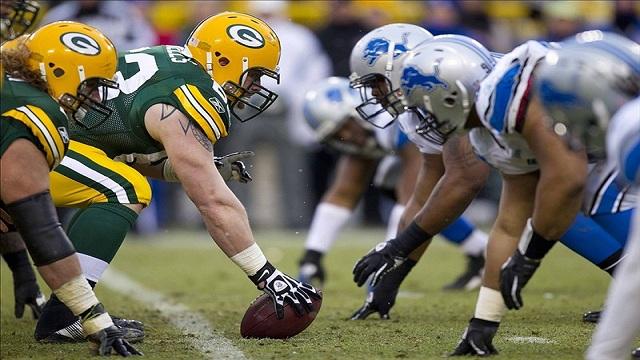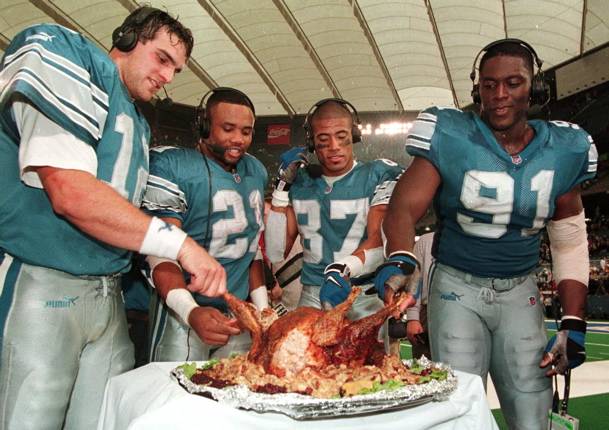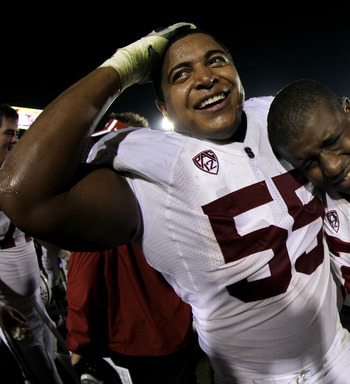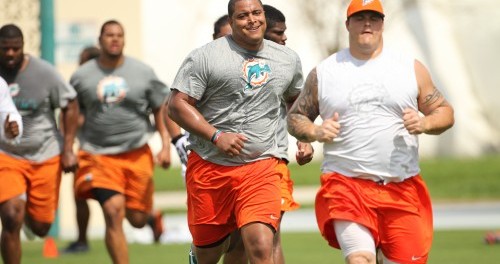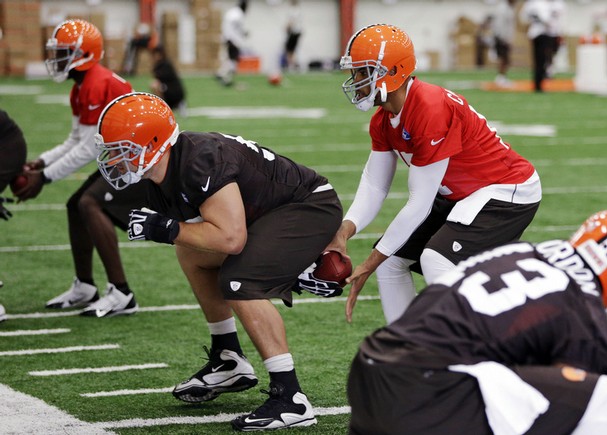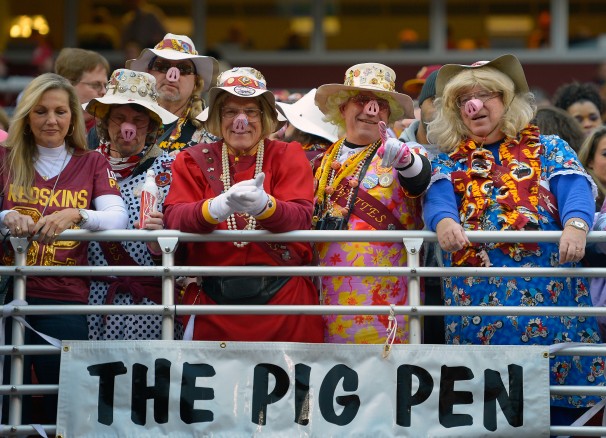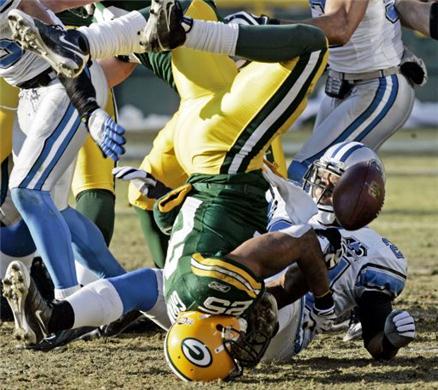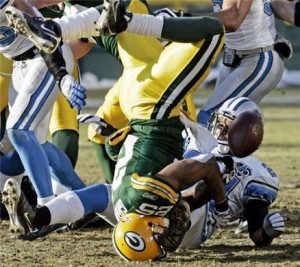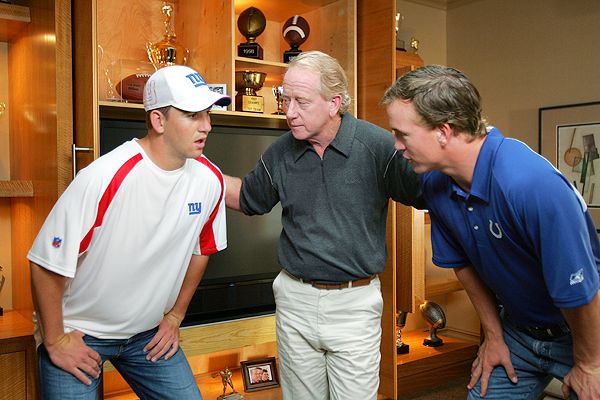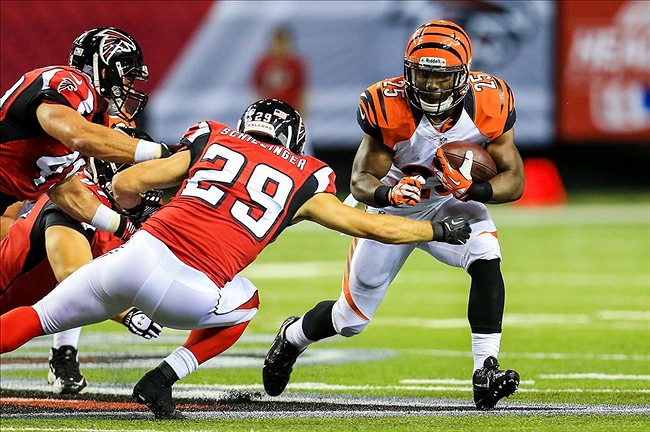As a companion to the recent post on why football is a special part of Thanksgiving for many sports fans, I’m going to explain some of the plot points of the three Thanksgiving day football games this year.
Game 1 — Packers at Lions, 12:30 on Fox
Game 2 — Raiders at Cowboys, 4:30 on CBS
Game 3 — Steelers at Ravens, 8:30 on NBC
I’m thankful to everyone who has read, commented, asked a question, or otherwise supported Dear Sports Fan this year.
Thanks and have a wonderful holiday,
Ezra Fischer
Green Bay Packers at Detroit Lions, 12:30 ET on Fox
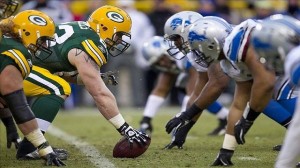
The first game of Thanksgiving Day begins early in the day, when the turkey is just starting on its eighteen hour journey to being slightly over-cooked when you serve it. The Detroit Lions are one of the two traditional teams (along with the Dallas Cowboys) that always host games on Thanksgiving. Since 2000 this has often meant that there wasn’t much drama to the game they were involved in. Since that year, the Lions have only had one winning season, and more often than not they were out of the playoff hunt and, frankly, a bit of a joke. This year is different. The Lions are tied for first place in their division and their opponent, the Packers, are only a half game back. We covered what “games back” means in a post recently but in this case the half game is because the Packers tied last week, not because they’ve played fewer games than the Lions.
The Lions are a predictably unreliable team. They are undeniably talented but prone to dumb mistakes and run-away tempers. They score the seventh most points in the league behind an exciting offense featuring quarterback Matthew Stafford, running back Reggie Bush, and wide-receiver Calvin Johnson. Sports writer and media mogul, Bill Simmons, recently wrote an ode to Johnson on his website Grantland that is worth reading. In it, he makes the case that Johnson is not only one of the best wide receivers ever but also, amazingly, almost totally non-controversial. Johnson wears 81 and truly is exciting to watch. Here’s how Simmons describes him:
And other than Randy Moss, I can’t remember being more excited about a receiver during that split second when his quarterback is heaving a football downfield, and the light bulb flickers on, and you say to yourself, “Wait, he’s going deep!”
When Stafford throws the ball deep to Johnson, tear yourself away from the potato chips and sneak a peak of a wide receiver who is a uber-talented physical freak.
The Green Bay Packers have had much more success over the last few decades than the Lions but they are missing their most important player. Quarterback Aaron Rodgers fractured his collarbone a few weeks ago and isn’t going to play tomorrow. That leaves the Packers reliant on rookie running back Eddie Lacy who has been performing excellently and in one of the most curious stories of the year, replacement quarterback Matt Flynn.
Here’s the story with Matt Flynn. He backed-up Aaron Rodgers from 2008 to 2011. In 2011 the Packers were so good that they had their playoff spot clinched before the last game of the season. They chose to hold Rodgers back from playing the game and played Flynn in his place both to prevent Rodgers from injury but also, I’d like to think, to pay back the long-time backup Flynn by giving him a chance to showcase himself to other teams before he became a free-agent at the end of that season. Showcase himself, he did! Flynn passed for 480 yards and 6 touchdowns, both of which set all-time team records. Sure enough, in the offseason he signed a three-year, $20.5 million dollar deal with the Seattle Seahawks. But before he played a game with Seattle, he lost the starting job to rookie Russell Wilson and at the end of the year, was traded to the Oakland Raiders. That brings us to this year when he AGAIN lost his starting job in training camp, this time to a second-year player, Terrelle Pryor. After a few poor performances when Pryor had a concussion, Flynn was cut. A few weeks later, the Buffalo Bills had some quarterback injuries themselves and signed him briefly but only as a last resort and then cut him a week or two later. And that’s when Aaron Rodgers broke his collarbone.
Now Flynn is starting on a nationally televised game with first place in the division and the playoff hopes of the team and their fans riding on the outcome. He played the second half of the last Packers game and did quite well, but it will be very interesting to see how he plays now that he’s the starter. Is there some special magic for him on the Packers that will transform him from the player who lost his job twice to unheralded younger players back to the record-setting backup? Or will he fail and go down in history as one of the weirder footnotes?

